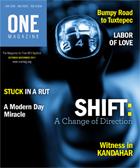
October-
November 2011
Shift: A Change of Direction
----------------------
|

Success cannot be measured by the quantity—or quality—of one's possesssions.
Pearl's Stuff
by Brenda Evans
I was up to my armpits in stuff…Pearl’s stuff. Two blenders, three food choppers, Santa collections, craft supplies, crock pots and electric skillets, racks of clothing, shoes, three sewing machines, hundreds of yards of fabric, four garbage bags of yarn, 80 spools of thread, two refrigerators, two freezers, one antique icebox, piles of assorted dishes, four radios, a half dozen boxes of documents and letters to sort. And that was just one end of the basement.
On the other end stood a 12-foot storage wall packed with silver-plated platters, trays, tea sets, and glass doo-dads. The facing wall housed shelves and cupboards loaded with gadgets and gizmos. Out back, three storage buildings overflowed with rusty tools, horse collars, pressure canners, picture frames, costume jewelry, bedpans, hats, old rugs, and scores of objects I couldn’t even name.
After three 30-cubic-yard roll-off containers, dozens of pick-up loads, a 24-foot U-Haul, and endless boxes, the house and outbuildings were finally emptied. All Pearl ever really wanted was everything—in multiples. But when she died, she left it all behind.
That’s when I stepped in. I was appointed to give usable items to relatives or charities; sort and preserve important papers, pictures, letters, and legal documents; make house repairs and put it on the market; work with the lawyer; go to court, pay bills, sell stocks, file for insurance, settle bank accounts, and keep records of every dime.
Simple purpose—monumental process! I handled, sorted, packed, tossed, and gave away thousands of items. Pearl’s financial mish-mash was equally difficult. The Pearl Project, as I called it, became a five-month, five-day-a-week ordeal. I wept, rejoiced, ranted, raved, and was overwhelmed.
But the project taught me important lessons about money and possessions. My friend was not wealthy, but she was comfortable. She had traveled across the United States, toured Europe, and basked in the Caribbean sun. She had a nice home, invested well, retired early, bought lots of stuff, and gave away—sadly—almost nothing.
Having money is a good thing. For Christians, it is a really good thing because it puts resources in the hands of people who should know how to use it well. Pearl had money, but she did not use it well. What did Pearl’s stuff teach me? Two things—self-indulgence is bad; frugality is good.
 Self-Indulgence Is Bad. Self-Indulgence Is Bad.
When I first began work on the Pearl Project, I assumed most of her things were salvageable, that her stuff, though excessive, would end up benefitting Christian ministries, the poor, the fatherless, the widows of her community.
It didn’t happen. Most of Pearl’s stuff was unusable—molded, mildewed, ruined, rusted, corroded, broken, and moth or rodent-damaged. Her possessions made huge mounds of debris at the local landfill, not contributions to charities. Once good and usable, Pearl’s stuff was utterly wasted.
Like gluttony and drunkenness, the unbridled pursuit of things is soundly condemned in Scripture, especially in Old Testament prose. David pledged faithfulness to the Lord in Psalm 101, saying he would not set worthless things before his eyes (101:3). Then in 119:37, the writer explicitly connects worthless things to material possessions. Repeatedly throughout the chapter, he urges us to identify true value and set our hearts and hands to the pursuit of “better” things.
In contrast, however, neither Old nor New Testament condemns extravagance for the Lord’s sake. Remember the interchange between Mary, Judas, and Jesus in John 12? Mary poured costly oil over Jesus’ feet. Judas whined about the waste. Jesus quickly rebuked him because she had given her best for the right reason.
Deuteronomy 14:22-29 puts lavish use of money in practical perspective. An annual tithe celebrated the Lord’s blessings. It was a celebration! If participants lived far away, they were encouraged to convert their products to money, spend the money for whatever their heart desired, then eat it in the sanctuary before the Lord with great rejoicing (Deuteronomy 14:26).
The passage repeats the phrase “whatever your heart desires.” Certainly, this was an exercise in abundance, extravagance. So, what’s the difference between Pearl’s stuff and the extravagance in Deuteronomy?
The “whatever” in Deuteronomy referred to food eaten in celebration to God. The lavishness was practical and usable, both as an act of worship and a model for the family. The extravagance was performed before an audience of God and family.
I can’t help but wonder if it would change my buying and spending habits if I had an audience for my purchases? Or what if long-term spiritual good guided everything I purchased? How would it affect my use of credit? Would I buy fewer non-essentials? Would I continue to spend just because I could?
What hurt most during the Pearl Project was that my dear friend did not consider other people—only herself. Checkbooks and tax returns revealed that she gave a pittance to her church, about $200 each year when an annual tithe would have neared $7,000. She also gave $100 to a local charity once a year. I had to face it. Pearl was not a generous person.
That’s another issue Deuteronomy 14 addresses. We are commanded to use our money beyond our own needs and desires. We must consider others, including Christian ministries. At the end of every third year, God required a tithe to benefit two groups: God’s men, the Levites who owned no land on which to make a living, and “the stranger and the fatherless and the widow” (14:29). In our buying, acquiring, and spending, God says we must never forget people, and Deuteronomy is clear that “people” does not only refer to family.
What’s the point? We need to look beyond family, friends, and the ends of our own noses. Jesus asked even more than Moses. Share the cloak off your back, He said, even if it is your last one.
Frugality Is Good.
The Pearl Project also taught me that frugality takes discipline. I honestly don’t like the word frugal. I’m quick to associate frugality with stinginess, certainly not what Scripture teaches. So, let me be clear. By frugality I mean being cautious, not wasteful, economical, prudent, resourceful. The Latin root suggests fruitfulness, enjoyment, and virtue, indicating an origin in richness not miserliness.
Frugality is a good thing, but it isn’t easy. Prosperity tends to breed foolishness, at least in me. In Deuteronomy 8 the Lord described a time when his people would become prosperous, lack nothing, become presumptuous, and forget Him (8:9-17). He bluntly warned them, “you shall remember the Lord your God, for it is He who gives you power to get wealth” (8:18).
Prosperity is from the hand and heart of God. Frugality is from mine. It is a skill, a discipline I can train my hand and heart to live out, as Paul urged Timothy. “Exercise yourself toward godliness” (1 Timothy 4:8).
Here are some things to help me with that training:
-
Admit the difference between real and artificial needs. Be satisfied with less than everything. Recognize need. Recognize want. Practice saying no to wants and yes to the needs of others.
-
Restrain the bent toward self-indulgence.
-
Suppress the urge for instant gratification. Be willing to wait.
-
Don’t spend leisure time looking for a “great deal” on something I don’t really need. Malls, discount stores, car dealerships, flea markets, even online shopping sites can be bad places to hang out.
I know. I know. This advice about how to use money seems contradictory. Be lavish but frugal, extravagant but economical. But that is how I see it. You might think I’m judgmental because I describe Pearls’ spending as self-indulgent rather than lavish. Because I judged her abundance as about want, not need. Because her sparse gifts to ministry and charity seemed stingy. Perhaps I am, and so I offer the Pearl Project as a cautionary tale—mostly for myself.
All she ever really wanted was everything—like me. That’s what I learned while standing up to my armpits in Pearl’s stuff.
About the Writer: Brenda Evans is a retired English teacher. She and her husband Bill (former director of the Free Will Baptist Foundation) live in Cattletsburg, KY. They are proud grandparents of seven.
|
|

